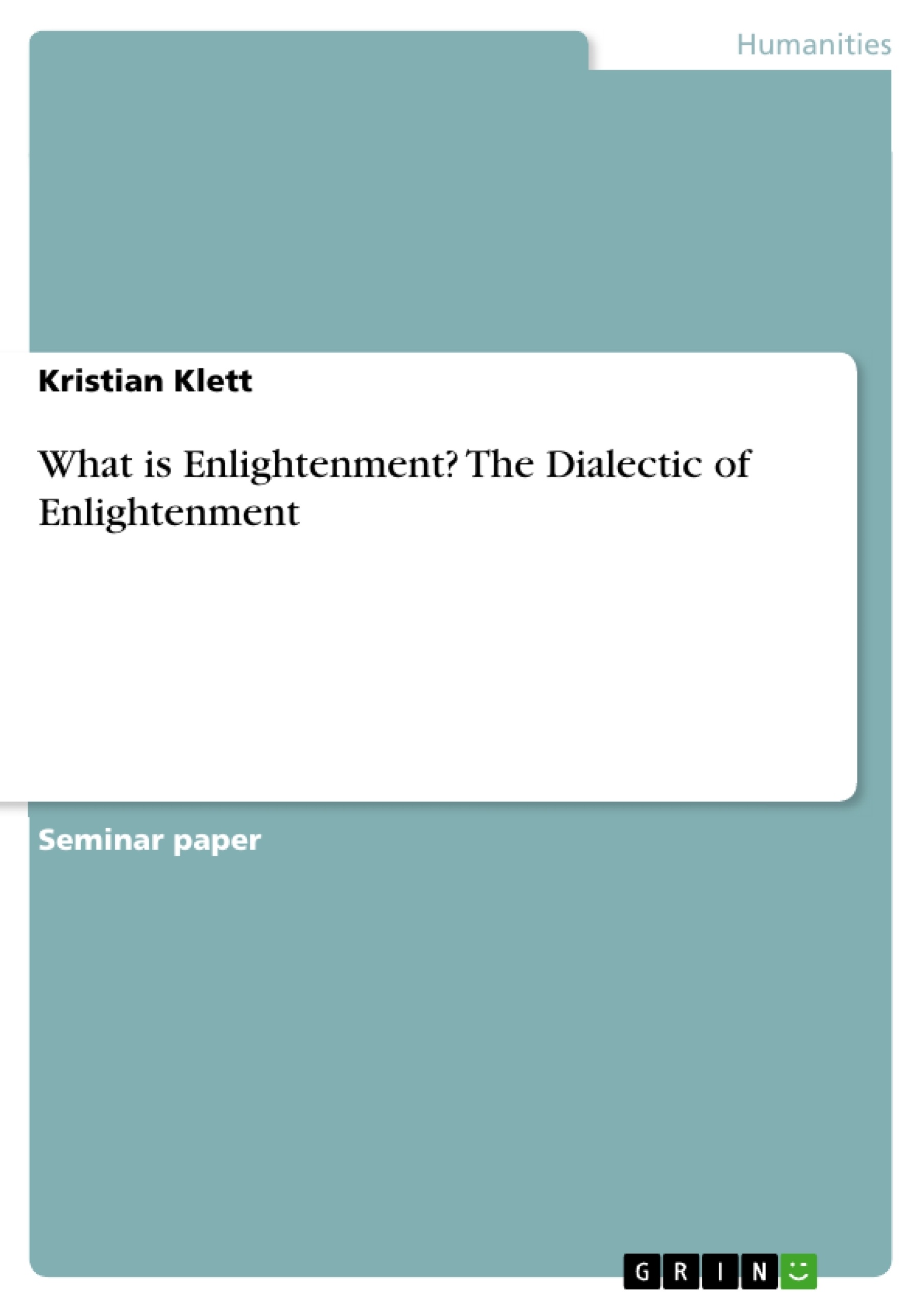While we live in a post-modern World - having the age of Enlightenment, the eighteenth century, far in our rear view mirror - the concept of Enlightenment is still a basic philosophical task. Its origin, its constitution and its goal are wildly disputed, unknown or undefined, whatever point of view might here be adequate. Still, Enlightenment is seen to be a determining part of human nature, of “what we are, what we think, what we do.” (Foucault, p.32) We still live (and an interesting question here would be: will we always live?) within the ‘shadow’ of the eighteenth century Enlightenment, even though the new era of modernity or post-modernity has been introduced. Since Enlightenment "dissolve[d] the injustice of the old inequality" (Adorno, p.12) of church, nobility, Bourgeoisie and the people, of mastery and serfdom with reason as its mediator, we face the problem of its side effects and its results, and - most importantly - its limits. Must man define his border to experience freedom (which is still within limits though they are not consciously felt, if these limits are wide enough), or can he overcome a reasonable reason in some way? Alternatively has institutionalised knowledge (with the help of religion) established a "building" of ideologies1 that is of eternal character? This leads to the question of possible "exits" from Enlightenment which already happens to have been a "way out" (Foucault, p.34) from immaturity, but is now mutilated to a new "prison" of human beings in post-modernity. Is the human mind ever to reach a state of "nirvana" or its secular utopia, a never available dream world; liberty of universals, the ultimate freedom? Will man ever be able to come back to paradise, now that he has eaten from the "tree of knowledge"? (Kantos, p.239)
This essay tries to elaborate on the post-modern view of Enlightenment through the perspective of Adorno and Horkheimer's "Dialectic of Enlightenment" and the contrary perspective of Foucault's essay, "What is Enlightenment?”
Table of Contents
- Introduction to Enlightenment in Modernity
- Adorno and Horkheimer, Concepts of Enlightenment
- Michel Foucault, What is Enlightenment?
- Conclusion Modernity, Ethos, Knowledge, Dialectic
Objectives and Key Themes
This essay examines the post-modern view of Enlightenment through the contrasting lenses of Adorno and Horkheimer's "Dialectic of Enlightenment" and Foucault's essay, "What is Enlightenment?". It aims to explore the concept of Enlightenment in its historical context and its enduring impact on modern thought.
- The shift from prehistoric to modern civilization marked by the emergence of Enlightenment.
- The role of reason and its limitations in shaping human experience.
- The impact of Enlightenment on language and thought.
- The concept of "mana" as a pre-Enlightenment mode of understanding the world.
- The enduring relevance of Enlightenment in understanding contemporary society.
Chapter Summaries
- Introduction to Enlightenment in Modernity: This chapter establishes the context of Enlightenment in the modern world. It examines the ongoing relevance of Enlightenment despite the emergence of post-modernity. The chapter highlights the enduring impact of Enlightenment on human nature and its enduring implications for understanding ourselves.
- Adorno and Horkheimer, Concepts of Enlightenment: This chapter delves into Adorno and Horkheimer's understanding of Enlightenment. It contrasts their view of Enlightenment with the conventional view of the 18th century. Adorno and Horkheimer argue that Enlightenment represents a radical shift in human history, leading to a transition from "chaos to civilisation". The chapter explores their concept of "mana" and how it signifies a pre-Enlightenment mode of understanding the world.
Keywords
This essay focuses on Enlightenment, its historical context, its impact on human culture, reason, "mana", and its relevance in the modern world. The essay draws upon the perspectives of Adorno, Horkheimer, and Foucault to explore these key concepts and their relationship to human experience.
Frequently Asked Questions
What is the 'Dialectic of Enlightenment' according to Adorno and Horkheimer?
It is the idea that Enlightenment, which aimed to liberate humans through reason, has paradoxically led to new forms of domination, myth, and a 'civilized' barbarism.
How does Michel Foucault view Enlightenment?
Foucault views it not as a historical period, but as an 'ethos' or a philosophical attitude—a permanent critique of our historical era and the limits imposed upon us.
What is the concept of 'mana' in this context?
Adorno and Horkheimer use 'mana' to describe a pre-Enlightenment mode of experience where the world was seen as an undifferentiated whole, before reason began to categorize and dominate nature.
Is Enlightenment seen as a 'prison' in post-modernity?
The essay explores the view that institutionalized knowledge and reason have created a new 'prison' of ideologies that limit true human freedom despite the promise of progress.
What is the 'exit' from immaturity mentioned by Foucault?
Referencing Kant, Foucault discusses Enlightenment as a 'way out' (Ausgang) from a state of self-incurred immaturity, where man begins to use his own reason without the guidance of others.
- Arbeit zitieren
- Kristian Klett (Autor:in), 1999, What is Enlightenment? The Dialectic of Enlightenment, München, GRIN Verlag, https://www.grin.com/document/29419



